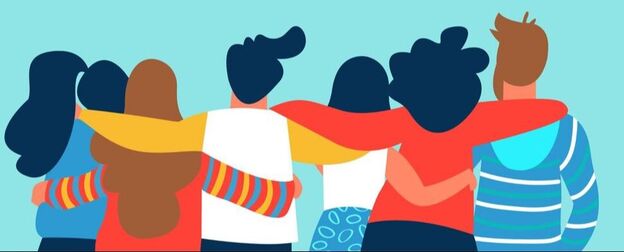I have always found North Carolina's state motto - Esse quam videri: To Be Rather Than To Seem - to be quite inspiring. I also think this motto is a good way for us to think about navigating our current (often online) world where it is relatively easy to seem a certain way but much harder to be real and present in the physical world. Furthermore, being involves - at least to come extent - action and doing versus projecting "action" through online signaling and seeming engaged.
Furthermore, in an age where it is easy to post one's opinions and thoughts online, to critique and pile-on, and to signal authority without real expertise, we as consumers and distributors of information must work to be rather than to seem...to be critical consumers of content and to work hard to be honest and effective communicators of information. None of this is easy...being in the real world, with all its messiness, never is. However, only in being action oriented can change happen both in our lives and in society writ large.
In a world with many systemic issues (climate change, inequality, discrimination), we must work to be change agents rather than to seem concerned and virtue signal without taking real action.
I firmly believe most systems can only be changed from within as knowledge of a current system helps inform how it could be improved...and the barriers to this improvement.
While these points are well-founded and certainly providing living wages to graduate students and postdocs is critical, what would change look like in the current system? That is a post for another time (but see my Reimagining the Postdoctoral Experience opinion piece written earlier this year for some thoughts) but what I do want to say here is that without being embedded in a system, it is very difficult (if not impossible) to understand the various factors that have led to a current state of affairs and the barriers to change. One can only be pragmatic through carefully assessing the limitations others within a system face when making change. In the example of academic labor, recently the University of California System's postdoctoral scholars reached a tentative agreement for higher salaries and other benefits but it is currently unclear who will pay for this. If the institutions push the additional cost of supporting a postdoc on faculty research grants, this will necessitate research cuts in other areas. And if there are less funds available to support research efforts in these groups, couldn't that have a negative impact on the postdocs involved in the research? So, while this seems like a positive development, it has not necessarily changed the various systems and institutions associated with the academic research enterprise. Although this is still a developing story, it seems one approach the University of California System could take is shifting the burden of covering the increased postdoc compensation package onto faculty supervisors who are already burdened with funding their work under the current system.
Change is challenging and multi-layered...when you solve one issue you introduce others.
Let's take a step back from higher education and academia, with its own unique issues, and look more generally at societal challenges around seeming vs being and reflect on the need to change current incentive structures that undermine human flourishing for many.
The recent news of the collapse of FTX and reports that the company leveraged its self-created digital token to shore up its finances seems at first unbelievable. How is such a thing even possible? One can create a digital "asset" out of nothing and assign it value? Well, yes. This is essentially what cryptocurrencies are - digital assets that have value because a group of people believe they have value. While the cryptocurrency bitcoin can point to the fact that it has scarcity on its side (ie, mathematically, only so many bitcoin can be "mined" and produced), many other digital assets have no constraints.
And while certainly all fiat currency is based on belief in a system (ie, government issuing it), there are often security measures in place to ensure the currency is protected and maintains a stable form of value (see the US Federal Reserve System and FDIC insurance as examples in the United States).
This is not the case with cryptocurrency. So, why did it gain so much popularity over the last few years? Mostly through rampant speculation but also it centered around a story many wanted to believe - that decentralized financial systems represent the future. And why that narrative may prove right over time, the largest flaw in this system is that while it points to the fact that it does not rely on trust in governments to keep currencies afloat, it does still involve trust in individuals to believe the currency has value. Money is ultimately a human trust exercise centered in belief with little tangible "realness" to any of it. Though trust may be stronger in some assets than others, especially at the current moment.
Ultimately, I think many recent cryptocurrencies exploded in value and popularity the past few years because they seemed like a great concept and way to speculatively grow one's assets without offering anything of real value. The collapse of FTX is yet another lesson in being critical and discerning in one's investments and not blindly buying into hype and groupthink.
The rise of social media over the past 10-15 years powered by a smart phone in virtually everyone's pocket led to rise in individuals signaling "success" or satisfaction on platforms such as Facebook, Instagram, and TikTok. An outside observer would be left to believe that nearly everyone on these platforms had amazing lives but, as we know, social media posts are really curations of one's daily/weekly "highlights" and not really what one's life actually looks like. New platforms have emerged to try to foster more "realness" on social media - see BeReal - but the fact remains that most people want to project a version of success and contentment to others.
As such, spending too much time on these social media platforms can produce unwarranted envy, depression, and other mental health issues in adolescent and adult consumers who weigh their current lives as deficient compared to what they see online.
It is so easy to sign up for workshops or events and then either not attend and wait for a link to a recording or resource or to "attend" but not really be present - the dreaded Zoom event where everyone but the presenter has their cameras off. While certainly some of these workshops are focused on information transmission which one may argue does not necessarily require "engagement", there is the hope individuals use the time to ask questions and engage not only with me but with each other.
Why is this important? Well, it is easy in our online world to feel alone while being virtually connected. Making space for individuals to engage with one another around topics like career exploration, having difficult conversations, the job search, etc....allows attendees to see they are not alone in their struggles and self-doubt. It is easy to think you alone are experiencing challenges and setbacks if you don't interact with other human beings for real and make space for authentic conversations.
If when one felt down or uncertain all one did was Google terms for "help", one would unfortunately often be presented with results that would suggest there is a clear way forward by following steps 1-X as outlined by expert BLAHBLAH. Sure, that advice could be helpful but reading cold insights online detaches you from the personal nature of the many challenges we face as human beings. The information shared might work for the individual sharing it given their unique situation but might not work for you.
Finding communities of support to engage with authentically is critical. And technology can help make these connections. In the end, though, you need to connect with others on a more personal level to have them open up about their own struggles, doubts, and experiences. Ultimately, these individuals may also be able to offer more personalized advice by engaging with you one-on-one (informational interviews). Most people want to be helpful but first they have to get to know you and trust you.
Getting involved in a group or organization helps bring meaning to our lives. Human beings need community and belonging to thrive. This can look different for each of us but the benefit of involving yourself in organizations or groups whose causes you care about provide an opportunity to meet and interact with others and the ability to bring change to the world in areas important to you.
I think of scientific advances as a good illustration of this concept of effects sometimes not being realized in real time. Scientific theories and ideas often cannot be implemented until other breakthroughs occur that make the technology needed to execute them cost effective and/or there is collective need to implement the science to respond to global challenges. The science that ultimately led to mRNA vaccines against the SARS-CoV-2 (corona) virus was developed over 30+ years, though it took a global pandemic for it to be fully realized as a tool to swiftly and efficiently create vaccines targeted to the specific genetic fingerprint of a virus.
You could also rephrase this as being present. Too often in modern society we are either super focused on the next task, item, or goal or we ruminate on past choices and decisions that can't be changed. Living in the present moment is challenging but is also the most actionable course to take. You control your present in many regards while your past is, well, past and the future is unpredictable and, frankly, unknowable.
Certainly there are challenges we face in our current world and it can be easy to get stuck in the mindset that structural challenges and barriers are too large for us to overcome. This can lead to paralysis and detachment...in fact we are seeing it in the data. Americans' confidence in major institutions are near all-time lows (measured since 1973), according to Gallup.
Percentage of Americans reporting great deal or quite a lot of confidence in:
- Congress: 7%
- Television news: 11%
- Big business: 14%
- U.S. Supreme Court: 25%
- Large technology companies: 26%
- Banks: 27%
- Public schools: 28%
The average confidence in major US institutions reached an all time low of 27% in 2022. For comparison, average confidence was 36% in 2020 and 43% in 2004. So, in 18 years we saw a confidence decline of ~37%.
A majority of adults (62%) disagreed with the statement, “our children are going to inherit a better world than we did,” and 63% disagreed with the statement, “I feel our country is on the path to being stronger than ever.”
More than three-quarters of adults (76%) said that the future of our nation is a significant source of stress in their lives, while 68% said this is the lowest point in our nation’s history that they can remember.
Furthermore, the COVID-19 pandemic and other challenges (opioid crisis) we have encountered over the past decade or so only highlight the amazing power of science and technology. In less than 12 months we went from sequencing the coronavirus to APPROVING mRNA vaccines for distribution in the US. A remarkable scientific achievement. Just as easily, however, scientific advances can produce powerful, highly addictive opiate medications that can destroy the lives of many who find the modern world unbearable.
What all these finding show are that humans have the capacity for innovation and adaptation...that we can push forward technology and change (both societal and environmental) with the power to create or destroy.
It is in our mindset and perception of the world, however, where we choose what path to take: a hopeful future where change happens for the better or a pessimistic view of humanity torn asunder by its own envy, discontent, and detachment. One requires action and individuals stepping up to be the change they want to see in the world...the other is, frankly, easier on the individual - let entropy and chaos reign.
Will you stand by and feel disempowered and disengaged or find ways to contribute in tangible, real ways to the lives of others?
This is because for a society to really change and advance it has to see the value in the change. It has to be bought into the notion that, on balance, the benefits of change outweigh the risks.
Doing requites putting oneself out there in the world, literally, and connecting and working with others to accomplish shared goals.
From the Blog
- Why You Should Get Involved In Things Outside the Lab/Work
- Cultivate Serendipity by Giving Back and Getting Involved
- Find Your Passion? Finding Meaning and Purpose in Your Work and Life
Online reads
Books




 RSS Feed
RSS Feed